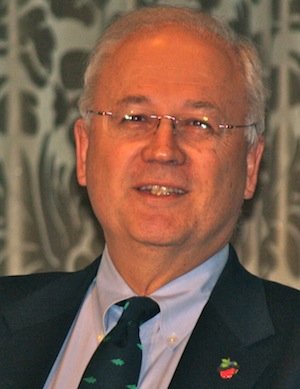Dale Foreman, the Washington State apple grower who chairs the U.S. Apple Association this year, took advantage of a once-in-a-lifetime opportunity as apple industry leader to make an impassioned speech.
At the USApple Outlook and Marketing Conference in Chicago, he confessed to disappointment in the Republican Party, in which he has served leadership positions and elected positions over the last 20 years, because of its unwillingness to pursue agricultural labor reform.
With the apple industry facing a labor crisis of monumental proportions, he said, he has sought out representatives of any political party who will pledge to work for agricultural labor reform. He is supporting—and asking growers to support—candidates who will pledge to do that.
“I made a pretty major switch a few weeks ago,” he said. He was involved in a fundraiser July 21 for Senator Maria Cantwell, Washington’s Democratic senator who is running for reelection. “I’ve written a lot of checks for political action committees,” he said, “but they always had the letter R after them.”
In Michigan, past USApple chair Julia Rothwell is on the stump for Michigan Democratic Senator Debbie Stabenow, who is chair of the Senate Agriculture Committee and sponsor of specialty crops provisions in the 2008 Farm Bill. Her committee, and the U.S. Senate, passed a new 2012 Farm Bill, retaining those provisions and addressing drought- and freeze-related issues now facing farmers. That bill, despite the urging of farm leaders, is being held up in the Republican-controlled House of Representatives.
Stabenow is seeking reelection against Republican Pete Hoekstra, who was ranking member of the U.S. House of Representatives Permanent Select Committee on Intelligence until 2010. Then he left the House to unsuccessfully run for governor of Michigan.
As a representative, Hoekstra represented Michigan’s most Republican district, a slice of western Michigan’s specialty crops region. He has voted in the past for measures to clamp down on illegal immigration and toughen border security but not for measures that would provide avenues to legal status for them.
Foreman, a lawyer who entered the orchard business in 1988, has been optimistically expanding in the apple business, despite early setbacks, like the Alar scare in 1989, his first year in the business. Despite that, he bought more orchards.
In the 1990s, he entered Washington State politics as a representative and went on to become a Republican Party leader. In 2000, he became “a recovering politican” when he was elected to the Washington Apple Commission and became involved in lobbying on behalf of the apple industry.
Now, he said, the labor situation is the most important threat to the state’s orchard businesses in the future.
“If I had a million dollars in extra money today, would I invest it in apple orchards or Apple stock at $636. I think Apple’s a fabulous company, but I think the future of the United States apple industry is markedly better,” he said. Labor is the major uncertainty about its future.
“Without ag labor reform, we are going to lose our investment in apples,” he said. Last year, his farm lost apples that were not picked or were picked in poor condition, and this year, an even bigger crop is on the trees.
His message to politicians: “While you guys can’t get together, we have millions of people who want to work and can’t work and billions of dollars of fruit rotting in the fields or hanging on the trees. We need you to do something. Get off your butts. Let’s get together and get something passed here.”
Foreman says politicians understand that kind of straight, tough talk.
“How can we be optimistic and continue to grow our businesses? There is huge opportunity,” he said. He looks at all the people in China and India and the growing middle class of people who want protein and high-quality fruit.
“We have to have an ag labor law so we can get this wonderful fruit picked,” he said.
He urged those in the audience to attend the noon luncheon of USApple’s political action committee, and to “write a personal, noncorporate check for $250.”


Leave A Comment